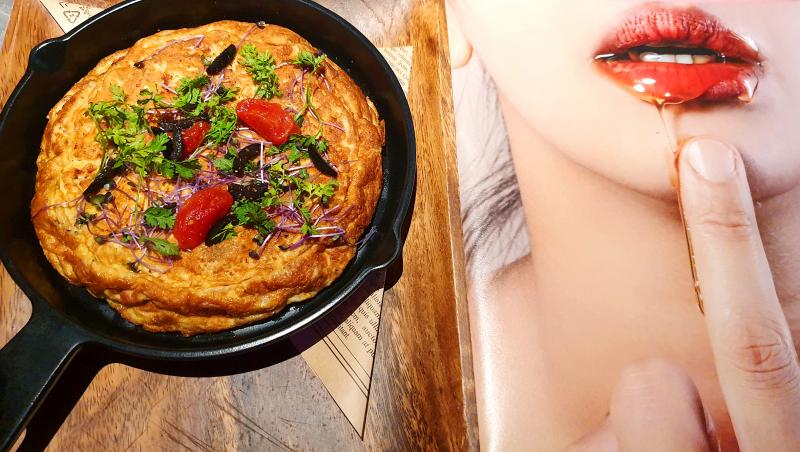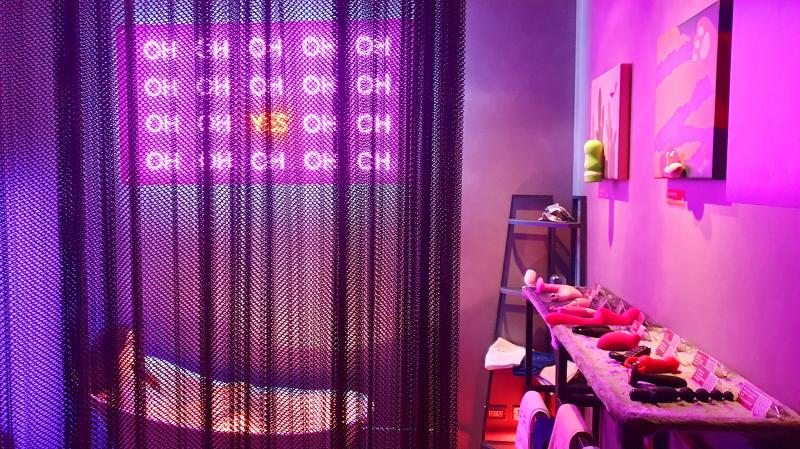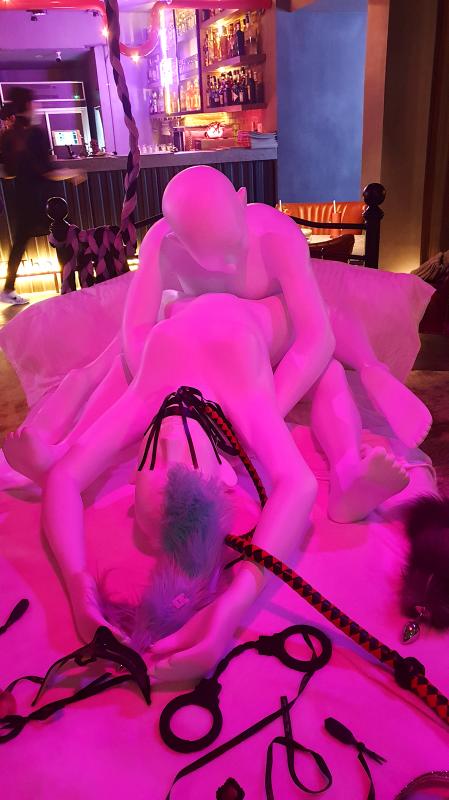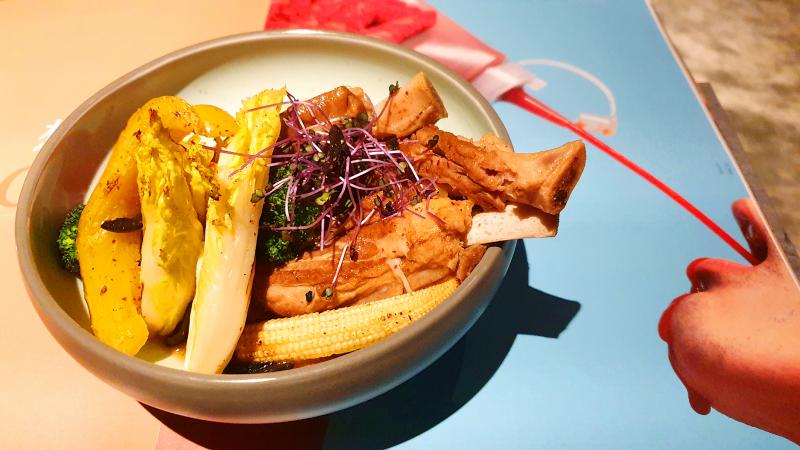We hand the waitress the key with the number 30 on it, and she leads us to the “secret room.” It’s darkly lit, the walls adorned with paintings that incorporate colorful designer vibrators, and towels emblazoned with suggestive phrases hanging from racks.
“This is Anita, she is the only staff here whom you can touch however you want,” the waitress says while pointing to a bathtub against a back wall.
I grope the rubbery, lifeless sex doll, and that was the highlight of the experience at The Room Bistro (房間餐酒), a sex-toy themed establishment. Okay, the food was pretty decent, but I was half-expecting something raunchier. There’s also the tagline, “Are you ready to release every cell in your body and use your most primal instincts to enjoy the direct stimulation of your senses?”

Photo: Han Cheung, Taipei Times
That doesn’t really happen. For those who are too timid to enter a sex store, this place is plenty edgy and could serve as a gentle introduction to the great unknown. However, it still felt that the kinky side was mostly a gimmick to attract the curious. Such is the case for most themed restaurants — remember the vampire restaurant or the toilet cafe?
Fortunately, Room Bistro isn’t quite that tacky, with more substance and thought put into it than the now-defunct Funny Sex Restaurant in Kaohsiung, where almost everything was genital or breast-shaped in some way.
But Room Bistro goes too far in the other direction. There was one table examining and discussing sex toys while enjoying drinks, but the others acted like regular diners. The staff were dressed exactly as if they were in your average lounge bar with no, um, embellishments. They try with the menu — which doubles as a product catalogue, full of suggestive pictures of models posing with food and pleasure devices as well as condoms and handcuffs — with cocktail names like “You are the ocean who makes me wet every night,” but the idea is still rather derivative.

Photo: Han Cheung, Taipei Times
HANDCUFFS, WHIPS AND DILDOS
And couples were using the bed in the middle, which came complete with handcuffs, whips and dildos that were scattered across as a backdrop for their Instagram selfies. I mean, what else are you going to do with a double-headed dildo in the middle of a public dining space anyway? While the mannequins on the bed in the throes of passion are eye-catching, they occupied most of the space instead of leaving room for the customers to get creative with their selfies. At least there could be subtle options such as eating while blindfolded or handcuffed to the table.
Anyway, it appears that the business model works, as the place is often fully booked on weekends.

Photo: Han Cheung, Taipei Times
One could argue that the food was indeed “sensual,” with layered flavors and intricate textures, and if those who need more stimulation can order a wide array of sauces for NT$40 each. We order the fritata (NT$250), which was cooked to the right amount of fluffiness but surprisingly stuffed with chewy bits of what seems to be tapioca, as well as pig’s blood cake.
I try dipping it in the three sauces we requested: Malaysian Lover bah kut teh (pork rib soup), Afternoon Wife pomelo pepper mayonnaise and Shanghai Nights Shaoxing wine vinegar. The mayonnaise is way too salty, overpowering the pomelo and the pepper flavors and leaving only spiciness. The vinegar is refreshing and has pleasant undertones of the signature wine flavor, but the bah kut teh is the best, just the right balance of sweet and savory with the distinct medicinal herb aftertaste of the broth slowly seeping across the tastebuds. I end up mostly using the bah kut teh sauce for the remaining two dishes.
Next is the “There’s a lot two people can do” luwei — a type of soy-sauce marinated braised snack food — set, (NT$350) with beef, asparagus, mushrooms and tofu. The morsels each offer distinct textures, and could be consumed without the sauces as they are already lightly braised with soy sauce and smoked. The smoky flavor interacts well with the medicinal bah kut teh aftertaste too.

Photo: Han Cheung, Taipei Times
The “Beer Trap” braised pork leg (NT$450) was tender and juicy, with the slightly sour beer marinade soaking through the meat. It came with an array of succulent vegetables such as red pepper and baby corn. We wondered aloud whether the items were meant to look phallic.
The food is enjoyable, but it does not stand out enough for a repeat visit, especially since the sensual theme leaves much more to be desired. Perhaps if it holds any special events — even just a sex toy demonstration — it might be worth going back to take a look. Otherwise, most people will probably visit once to get that selfie.

Photo: Han Cheung, Taipei Times

On April 26, The Lancet published a letter from two doctors at Taichung-based China Medical University Hospital (CMUH) warning that “Taiwan’s Health Care System is on the Brink of Collapse.” The authors said that “Years of policy inaction and mismanagement of resources have led to the National Health Insurance system operating under unsustainable conditions.” The pushback was immediate. Errors in the paper were quickly identified and publicized, to discredit the authors (the hospital apologized). CNA reported that CMUH said the letter described Taiwan in 2021 as having 62 nurses per 10,000 people, when the correct number was 78 nurses per 10,000

As we live longer, our risk of cognitive impairment is increasing. How can we delay the onset of symptoms? Do we have to give up every indulgence or can small changes make a difference? We asked neurologists for tips on how to keep our brains healthy for life. TAKE CARE OF YOUR HEALTH “All of the sensible things that apply to bodily health apply to brain health,” says Suzanne O’Sullivan, a consultant in neurology at the National Hospital for Neurology and Neurosurgery in London, and the author of The Age of Diagnosis. “When you’re 20, you can get away with absolute

May 5 to May 11 What started out as friction between Taiwanese students at Taichung First High School and a Japanese head cook escalated dramatically over the first two weeks of May 1927. It began on April 30 when the cook’s wife knew that lotus starch used in that night’s dinner had rat feces in it, but failed to inform staff until the meal was already prepared. The students believed that her silence was intentional, and filed a complaint. The school’s Japanese administrators sided with the cook’s family, dismissing the students as troublemakers and clamping down on their freedoms — with

As Donald Trump’s executive order in March led to the shuttering of Voice of America (VOA) — the global broadcaster whose roots date back to the fight against Nazi propaganda — he quickly attracted support from figures not used to aligning themselves with any US administration. Trump had ordered the US Agency for Global Media, the federal agency that funds VOA and other groups promoting independent journalism overseas, to be “eliminated to the maximum extent consistent with applicable law.” The decision suddenly halted programming in 49 languages to more than 425 million people. In Moscow, Margarita Simonyan, the hardline editor-in-chief of the